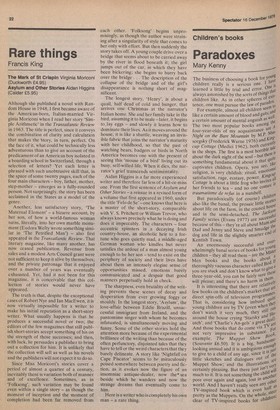Rare things
Francis King
The Mark of St Crispin Virginia Moriconi (Duckworth £4.95) Asylum and Other Stories Aidan Higgins (Calder £5.95) Although she published a novel with Random House in 1948, I first became aware of the American-born, Italian-married Virginia Moriconi when I read her story 'Simple Arithmetic' in the Transatlantic Review in 1963. The title is perfect, since it conveys the combination of clarity and calculation that makes the Story, in turn, perfect. On the face of it, what could be technically less adventurous than to give an account of the predicament of an American boy isolated in a boarding school in Switzerland, through a selection of letters? Yet each letter is phrased with such unobtrusive skill that, in the space of some twenty pages, each of the four main characters — boy, father, mother, step-mother — emerges as a fully-rounded person. Not surprisingly, the story has been acclaimed in the States as a model of the genre.
Another, less satisfactory story, 'The Maternal Element' — a bizarre account, by her son, of how a world-famous woman turns, literally, into her own marble monument (Eudora Welty wrote something similar in 'The Petrified Man') — also first appeared in the Transatlantic Review. That literary magazine, like many another, has now ceased publication, Revenue from sales and a modest Arts Council grant were not sufficient to keep it alive by themselves; and the private patronage that it enjoyed over a number of years was eventually exhausted. Yet, had it not been for this magazine, it is conceivable that this collection of stories would never have appeared.
The truth is that, despite the exceptional cases of Robert Nye and Ian MacEwen, it is ' now virtually impossible for a writer to make his initial reputation as a short-story writer. What usually happens is that he produces a successful novel or two; the editors of the few magazines that still publish short-stories accept something of his on the strength of those successes; and then, with luck, he persuades a publisher to bring out a collection for him. It is unlikely that the collection will sell as well as his novels and the publishers will not expect it to do so.
Since Miss Moriconi's stories cover a period of almost a quarter of a century, inevitably there is variation both of manner and of excellence. Sometimes, as in 'Folksong', such variation may be found even within a single story — as though the moment of inception and the moment of completion had been far removed from each other. 'Folksong' begins unpromisingly, as though the author were straining after a singularity of style that comes to her only with effort. But then suddenly the story takes off. A young couple drive over a bridge that seems about to be carried away by the river in flood beneath it; the girl jumps out of the car, in which they have been bickering; she begins to hurry back over the bridge. . . The description of the collapse of the bridge and of the girl's disappearance is nothing short of magnificent.
The longest story, 'Henry', is about a quail, half dead of cold and hunger, that arrives one Christmas at the narrator's Italian home. She and her family take in the bird, assuming it to be male —later, it begins to lay eggs — and slowly it learns how to dominate their lives. As it moves around the house, it is like a shuttle, weaving an invisible fabric that joins the narrator's maturity with her childhood, so that the past of watching bears, badgers or birds in North America becomes one with the present of seeing this 'mouse of a bird' living out its busy, self-willed life. When it dies, the narrator's grief transcends sentimentality.
Aidan Higgins is a far more experienced writer and therefore far less of a hit-or-miss one. From the first sentence of Asylum and Other Stories —a reissue in a revised form of a volume that first appeared in 1960, under the title 'Feb° de Se' — one knows that here is a master of the short-story, comparable with V. S. Pritchett or William Trevor, who always knows precisely what he is doing and does it impeccably. The characters — four eccentric spinsters in a decaying Irish country-house, an alcoholic heir to a fortune who goes quietly mad, a middle-aged German woman who kindles but never satisfies the ardour of a man almost young enough to be her son — tend to exist on the periphery of society and their lives have about them an intensely elegiac sense of opportunities missed, emotions barely communicated and a despair that good manners perpetually hold in check.
The sharpness, even brutality of the writing prevents these scenes of decay and desperation from ever growing foggy or mouldy. In the longest story, 'Asylum', the love-affair between Eddie Brazill, unsuccessful immigrant from Ireland, and the pantomime singer with whom he becomes infatuated, is simultaneously moving and funny. Some of the other stories hold the attention more because of the experimental brilliance of the writing than because of the often perfunctory, disjointed tales that they have to tell or the weird characters that they barely delineate. A story like 'Nightfall on Cape Piscator' seems to be miraculously poised somewhere between poetry and fiction, as it evokes now the figure of an insomniac antique-dealer, now the sea beside which he wanders and now the strange dreams that eventually come to him.
Here is a writer who is com pletely his own man — a rare thing.


































 Previous page
Previous page